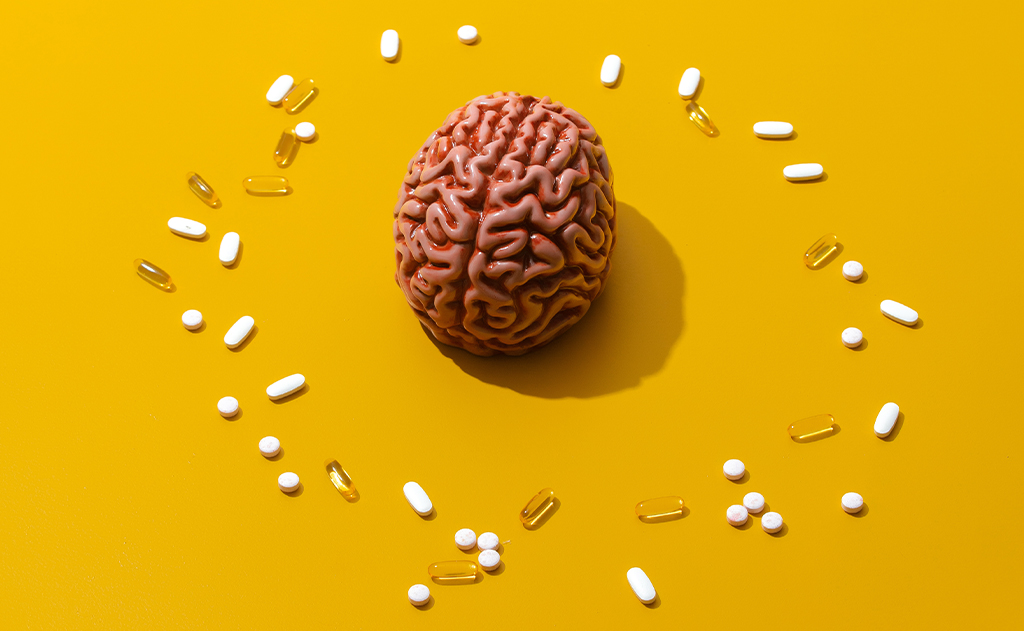Brain Health Supplements: How Vitamin D3 and K2 Boost Focus

In recent years, brain health supplements have gained remarkable popularity — and for good reason. As people live longer and face greater mental demands, many are realizing that nutrition plays a powerful role in how clearly we think and how well our brains age. What we eat directly affects the brain’s structure, chemistry, and performance. The right nutrients can protect brain cells, support neurotransmitter activity, and reduce inflammation — all key to maintaining sharp focus, strong memory, and long-term mental clarity.
Among these nutrients, two vitamins have drawn growing attention for their unique roles in cognitive health: vitamin D3 and vitamin K2. Vitamin D3 supports nerve growth, helps regulate mood-related neurotransmitters, and protects the brain from oxidative stress. Low levels of vitamin D have been linked to reduced cognitive performance and an increased risk of conditions such as dementia and Alzheimer’s disease. Vitamin K2, while best known for its importance to bone and heart health, also contributes to brain resilience. It helps produce sphingolipids—essential components of brain cell membranes—and activates proteins that protect neurons from damage.
Together, vitamin D3 and K2 form a powerful duo for supporting brain function, memory, and emotional balance. Their synergy highlights an essential truth: nutrition and mental performance are deeply connected, and caring for your brain starts with nourishing it from within.
What Vitamins Are Good for Brain Health?
A healthy brain relies on a steady supply of essential vitamins and minerals to stay sharp, focused, and balanced. Certain nutrients directly influence how brain cells communicate, how efficiently we process information, and how well we manage stress. Among the most important for cognitive health are Vitamin D3, Vitamin K2, B-vitamins, Omega-3 fatty acids, and Magnesium. Together, these nutrients help improve memory, boost concentration, and protect the brain from premature aging and decline.
Vitamin D3 – The Brain’s Sunshine Vitamin: Vitamin D3 supports the brain on multiple levels. It helps regulate the production of serotonin and dopamine—two neurotransmitters critical for mood and motivation—while also promoting the growth and protection of nerve cells. Adequate vitamin D levels are linked with sharper thinking, improved focus, and a lower risk of depression or cognitive decline.
Vitamin K2 – The Protector of Brain Cells: Once known only for its role in bone and heart health, Vitamin K2 is now recognized as vital for brain function. It helps direct calcium to where it’s needed and prevents buildup in brain tissues and arteries, supporting proper blood flow and oxygen delivery. K2 also contributes to the production of sphingolipids—fatty molecules that strengthen brain cell membranes and enhance communication between neurons.
B-Vitamins – The Energy and Mood Regulators: The family of B-vitamins—especially B6, B9 (folate), and B12—plays a key role in keeping the brain energized and emotionally balanced. These vitamins help create neurotransmitters that regulate mood and concentration while also supporting energy production within brain cells. Low B-vitamin levels can cause mental fatigue, memory lapses, and irritability.
Omega-3 Fatty Acids – Fuel for the Mind: Omega-3s (especially DHA and EPA) are essential fats that build and maintain brain cell membranes. They improve the way neurons communicate, which enhances learning, recall, and focus. Omega-3s also reduce inflammation, supporting overall mental clarity and emotional balance.
Magnesium – The Calming Mineral: Magnesium supports the nervous system by balancing neurotransmitters that control mood, relaxation, and focus. It also helps regulate stress hormones and improve sleep quality—two key factors for mental performance and memory. Without enough magnesium, people often experience restlessness, anxiety, or difficulty concentrating.
The Power of Vitamin D3 and K2 for Mental Health
The connection between vitamin D and mental health is stronger than ever. Once known mainly for supporting bone strength, vitamin D3 is now recognized as a key player in emotional balance, memory, and overall brain function. It acts more like a hormone than a vitamin, influencing the production of neurotransmitters like serotonin and dopamine, which control mood, motivation, and focus. When vitamin D levels run low, the brain’s chemical balance can shift—often leading to symptoms of depression, anxiety, fatigue, and brain fog (1). In fact, research has linked chronic vitamin D deficiency to a higher risk of developing mood disorders and neurodegenerative conditions such as Alzheimer’s disease and dementia. Adequate D3 levels, on the other hand, are associated with sharper thinking, improved energy, and a greater sense of emotional stability.
Vitamin D3 doesn’t just affect mood—it also protects and strengthens the brain on a structural level. It helps regulate inflammation, supports healthy blood flow, and encourages the growth and repair of neurons. These actions are vital for preserving neuroplasticity, the brain’s ability to adapt and form new connections that support learning and memory. Studies have found that people with sufficient vitamin D perform better on memory and cognitive tests and show a reduced risk of age-related decline, highlighting how important this nutrient is for lifelong brain health.
Working alongside D3, vitamin K2 brings its own essential benefits. While it’s best known for supporting bone and heart health, K2 also helps keep the brain functioning at its best by maintaining calcium balance in the body. When calcium isn’t properly regulated, it can build up in blood vessels and even brain tissue, restricting circulation and contributing to cognitive impairment. K2 activates proteins that prevent this buildup, ensuring calcium is directed where it belongs—strengthening bones and protecting arteries. It also supports the creation of sphingolipids, vital fats that protect brain cells and enhance cell-to-cell communication. Low K2 levels have been associated with reduced cognitive performance and may play a role in conditions like Alzheimer’s disease and vascular dementia (2).
How Vitamin D3/K2 Supports Memory and Focus
While vitamin D3 and K2 play vital roles in emotional well-being, their benefits extend far beyond mood—they’re also among the most effective vitamins for memory, focus, and long-term cognitive health. Vitamin D₃ helps the brain process information more efficiently by supporting synaptic signaling, the communication between neurons that underlies concentration, learning, and problem-solving. It also boosts mitochondrial energy production within brain cells, helping to power sustained attention and mental stamina. People with optimal vitamin D levels often experience clearer thinking and stronger focus, while deficiency has been associated with slower reaction times and difficulty retaining new information.
Equally important, vitamin D3 enhances the brain’s ability to strengthen existing connections and form new ones. This capacity to adapt is what allows us to build memories and develop new skills throughout life. By reducing oxidative stress and supporting cellular repair, D3 helps the brain remain flexible and resilient, even under pressure. Emerging studies show that maintaining healthy vitamin D levels can improve short-term memory, learning capacity, and overall mental performance, making it one of the most valuable vitamins for sustaining memory and focus with age.
Vitamin K2 complements these benefits by maintaining the brain’s structural integrity and nutrient flow. It supports the production of sphingolipids, specialized fats that keep neuron membranes strong and responsive, enabling faster thought processing and improved recall. K2 also promotes healthy blood circulation and oxygen delivery to the brain, which helps sustain concentration and clarity during mentally demanding tasks. Working together, vitamin D3 and K2 act as a synergistic pair—D3 energizes the brain’s internal systems, while K2 protects its physical framework—resulting in sharper focus, stronger memory retention, and lasting cognitive performance.
What Vitamin Deficiency Causes Anxiety and Mood Swings?
Just as the right nutrients can sharpen focus and memory, certain vitamin deficiencies can quietly affect emotional balance and stress tolerance. Low levels of vitamin D, B-complex vitamins, and magnesium are among the most common nutritional factors linked to anxiety, irritability, and brain fog (3). These nutrients play direct roles in how the brain produces calming neurotransmitters, manages energy, and responds to daily stress—so even a mild deficiency can leave you feeling mentally drained or emotionally off-center.
Vitamin D3 is especially influential in mood regulation. Beyond its role in cognition, it helps stabilize the body’s stress response and supports healthy serotonin activity. When levels drop, people often notice greater sensitivity to stress and low mood. Pairing D3 with vitamin K2 enhances its effectiveness by improving absorption and circulation, allowing D3 to work more efficiently throughout the body and brain. Together, they create a foundation for steadier energy and a calmer, more balanced emotional state.
B-vitamins, particularly B6, B9 (folate), and B12, act as the brain’s “mood nutrients.” They’re required for producing serotonin, dopamine, and GABA—the messengers that keep you feeling positive and focused. Low B-vitamin levels have been associated with increased stress, irritability, and even depressive symptoms (4). Likewise, magnesium supports the nervous system by helping muscles relax and regulating cortisol, the body’s main stress hormone (5). Without enough magnesium, tension, restlessness, and poor sleep can quickly follow.
Choosing the Right Brain Health Supplements
When it comes to supplementing for cognitive wellness and emotional balance, not all products are created equal. Here’s a practical guide to selecting high-quality brain health supplements—plus how to integrate vitamin D3/K2 as a strategic anchor in your routine. Remember to always check with your healthcare provider before starting any supplement routine—especially if you take medication or have a health condition.
What to Look For:
- Clean Ingredients: Choose formulas that clearly list every ingredient and dosage. Look for pure, bioavailable forms like Vitamin D3 (cholecalciferol) and Vitamin K2 (MK-7) without fillers or additives.
- Balanced Dosage: Research supports 5,000 IU of D3 with 100 µg of K2—an ideal ratio for brain, bone, and heart health.
- Synergy That Works: D3 boosts calcium absorption; K2 directs it to where it belongs, improving circulation and supporting cognitive function.
- Better Absorption: Fat-soluble vitamins absorb best in oil-based or softgel capsules, especially when taken with food.
After testing many formulas, I’ve formulated this supplement that strikes the perfect balance of quality and bioavailability. It’s the same supplement I personally use and recommend to my patients to help support focus, mood, and long-term brain vitality.
Daily Habits to Boost Vitamin Absorption and Brain Performance
Even the best supplements work best when paired with healthy daily habits. Simple lifestyle choices can significantly improve how your body absorbs vitamins—and how your brain performs overall. Think of these habits as small, consistent actions that make a big difference in energy, focus, and mental clarity.
- Get Consistent Sunlight Exposure: A few minutes of natural sunlight each day helps your body produce vitamin D3 naturally and enhances the effectiveness of your supplements. Aim for 10–20 minutes outdoors when possible, ideally in the morning or late afternoon.
- Eat Nutrient-Dense, Whole Foods: Pair your supplements with a balanced diet rich in omega-3 fats, leafy greens, colorful vegetables, and lean proteins. Healthy fats—like those in salmon, avocado, and olive oil—help the body absorb fat-soluble vitamins such as D3 and K2 more efficiently.
- Stay Hydrated: Dehydration can slow down nutrient transport and brain function. Aim for steady hydration throughout the day—water, herbal teas, and mineral-rich fluids all help your body use vitamins more effectively and keep your mind alert.
- Prioritize Rest and Stress Management: Chronic stress depletes vital nutrients and interferes with neurotransmitter balance. Incorporate calming practices such as deep breathing, light movement, or meditation. Getting 7–9 hours of quality sleep each night also helps your brain process and store information more efficiently.
- Keep Moving: Regular physical activity improves blood flow, delivering oxygen and nutrients directly to the brain. Even short walks, stretching, or low-impact exercise can boost mental clarity and support long-term brain health.
Final Thoughts: Building a Sharper, Calmer Mind
Supporting your brain isn’t just about improving memory or focus—it’s about creating balance that lasts. By pairing your Vitamin D3 + K2 supplement with simple daily habits like sunlight exposure, nutrient-rich meals, and mindful movement, you nourish the brain from the inside out. This consistent approach promotes clearer thinking, steadier mood, and long-term vitality. In the end, it’s the small, intentional choices you make each day that build the foundation for a sharper, calmer mind.





